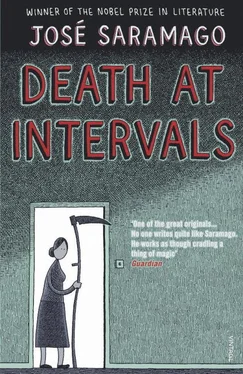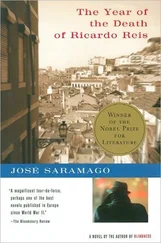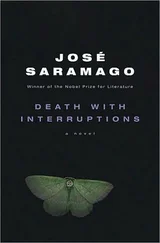THE PROTAGONISTS OF these dramatic events, described in unusually detailed fashion in a story which has, so far, preferred to offer the curious reader, if we may put it so, a panoramic view of the facts, were, when they unexpectedly entered the scene, given the social classification of poor country folk. This mistake, the result of an overhasty judgement on the part of the narrator, based on an assessment which was, at best, superficial, should, out of respect for the truth, be rectified at once. A family of poor country folk, if they were truly poor, would not be the owners of a cart nor would they have money enough to feed an animal with the large appetite of a mule. They were, in fact, a family of smallholders, reasonably well-off in the modest world they lived in, well-brought-up people with sufficient schooling to be able to hold conversations which were not only grammatically correct, but which also had what some, for lack of a better word, call content, others substance, and others, perhaps more vulgarly, meat. Were that not the case, the maiden aunt would never have been able to come out with the lovely sentence we commented on before, What will the neighbours say when they notice the absence of these two people who were at death’s door, but couldn’t die. Hurriedly filling in that gap, and with truth restored to its rightful place, let us now hear what the neighbours did say. Despite all the family’s precautions, someone had seen the cart and puzzled over why those three people would be going out at that late hour. This was precisely the question the vigilant neighbour asked himself, Where are those three off to at this hour, a question repeated the following morning, with only slight modification, to the old farmer’s son-in-law, Where were you three off to at that hour of the night. The son-in-law replied that they’d had some business to attend to, but the neighbour was not convinced, Business to attend to at midnight, with the cart, and your wife and your sister-in-law, that’s a bit odd, isn’t it, he said, It might be odd, but that’s how it was, And where were you coming from when the sky was just beginning to grow light, That’s hardly your affair, You’re right, I’m sorry, it really isn’t my affair, but I assume you won’t mind my asking after your father-in-law, Much the same, And your little nephew, He’s much the same too, Well, I hope they both get better, Thank you, Goodbye, Goodbye. The neighbour walked away, stopped and turned back, It seemed to me that you were carrying something in the cart, it seemed to me that your sister had a child in her arms, and if so, the figure lying down covered by a blanket was probably your father-in-law, what’s more, What’s more, what, What’s more, when you came back, the cart was empty and your sister had no child in her arms, You obviously don’t sleep much at night, No, I sleep very lightly and wake easily, You woke up when we left and when we came back, that’s what people call coincidence, That’s right, And you want me to tell you what happened, Only if you’d like to, Come with me. They went into the house, the neighbour greeted the three women, I don’t wish to intrude, he said, embarrassed, and waited. You’ll be the first person to know, said the son-in-law and you won’t have to keep it a secret because we won’t ask you to, Please, only tell me what you want to, My father-in-law and my nephew died last night, we took them over the border, where death is still active, You killed them, exclaimed the neighbour, In a way, yes, given that they couldn’t have gone there under their own steam, but in a way, no, because we did it at the request of my father-in-law, and as for the child, poor thing, he had no voice in the matter and no life worth living, they’re buried at the foot of an ash tree, in each other’s arms you might say. The neighbour clutched his head, And now, Now you’ll go and tell the whole village, we’ll be arrested and taken to the police, and probably tried and sentenced for what we didn’t do, But you did do it, A yard from the frontier they were still alive, a yard further on, they were dead, when exactly, according to you, did we kill them and how, If you hadn’t taken them there, Yes, they would be here, waiting for a death that wouldn’t come. Silent and serene, the three women were watching the neighbour. I’m off, he said, I thought something had happened, but I never imagined anything like this, Please, I have a favour to ask, said the son-in-law, What, Come with me to the police, that way you won’t have to go from door to door telling people about the horrible crimes we’ve committed, I mean, imagine, patricide and infanticide, good grief, what monsters live in this house, That isn’t how I would put it, Yes, I know, so come with me, When, Now, strike while the iron is hot, Let’s go then.
They were neither tried nor sentenced. Like a lit fuse, the news spread rapidly through the nation, the media inveighed against the loathsome creatures, the murderous sisters, the son-in-law accomplice, they shed tears over the old man and the innocent child as if they were the grandfather and grandson everyone would like to have had, for the thousandth time, those right-thinking newspapers who acted as barometers of public morality pointed the finger at the unstoppable decline in traditional family values, which was, in their opinion, the fount, cause and origin of all ills, and then, only forty-eight hours later, news started coming in of identical incidents happening throughout the border regions. Other carts and other mules transported other defenceless bodies, fake ambulances wound along deserted country lanes to reach the place where they could unload the bodies, usually kept in their seats for the duration by seat belts, although there was the occasional disgraceful instance of bodies being stowed in the boot and covered with a blanket, cars of all makes, models and prices journeyed towards this new guillotine, whose blade, if you’ll forgive the very free comparison, was the slender line of the frontier invisible to the naked eye, each vehicle carrying those poor unfortunates whom death, on this side of the line, had kept in a state of permanent dying. Not all the families who acted thus could allege in their defence the same motives, in some ways respectable, but nevertheless debatable, as our anguished farming family who, never imagining the consequences of their actions, had sparked this traffic. Some who made use of this expedient to get rid of their father or grandfather in a foreign land merely saw it as a clean, efficient way, although radical might be a better word, of freeing themselves from the genuine dead-weights that their dying relatives had become to them at home. The media who, earlier, had energetically denounced the daughters and son-in-law of the old man buried along with his grandson, including in their vituperations the maiden aunt, accusing her of complicity and connivance, now stigmatised the cruelty and lack of patriotism of apparently decent folk who, at this time of grave national crisis, had let slip the hypocritical mask that concealed their true natures. Under pressure from the governments of the three neighbouring countries and from the opposition parties, the prime minister condemned these inhumane activities, citing the need to respect human life and announcing that the armed forces would immediately take up positions along the frontier to prevent any citizen in a state of terminal physical decline from crossing over, whether on their own initiative or due to some arbitrary decision taken by relatives. Deep down, of course, although the prime minister dared not say this out loud, the government was not entirely opposed to an exodus which would, in the final analysis, serve the interests of the country by helping to lower the demographic pressure that had been building continuously over the last three months, although it was still far from reaching truly worrying levels. The prime minister also neglected to say that he’d had a discreet meeting with the interior minister that very day, the aim of which was to set up a nationwide network of vigilantes, or spies, in cities, towns and villages, whose mission would be to inform the authorities of any suspicious moves made by people with close relatives in a state of suspended death. The decision to intervene or not would be made on a case-by-case basis, since it was not the government’s intention to put a complete stop to this new kind of migratory urge, but, rather, to satisfy, at least in part, the concerns of the governments of countries with whom they shared a border, enough, at least, to silence their complaints for a time. We’re not here just to do what they want us to do, said the prime minister firmly, The plan will still exclude small hamlets, large estates and isolated houses, remarked the interior minister, We’ll leave them to their own devices, they can do what they like, for as you know from experience, my friend, it’s impossible to have one policeman per person.
Читать дальше












